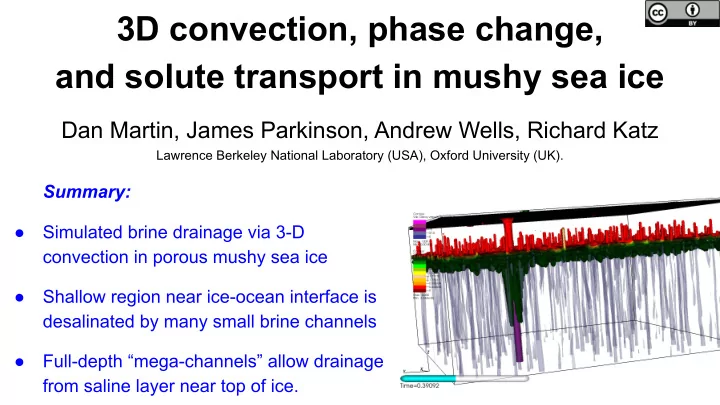

3D convection, phase change, and solute transport in mushy sea ice Dan Martin, James Parkinson, Andrew Wells, Richard Katz Lawrence Berkeley National Laboratory (USA), Oxford University (UK). Summary: ● Simulated brine drainage via 3-D convection in porous mushy sea ice ● Shallow region near ice-ocean interface is desalinated by many small brine channels ● Full-depth “mega-channels” allow drainage from saline layer near top of ice.
What is a mushy layer? Dense brine drains convectively from porous mushy sea ice into the ocean. - What is spatial structure of this flow in 3 dimensions? Upper fig.: Sea ice is a porous mixture of solid ice crystals (white) and liquid brine (dark). H. Eicken et al. Cold Regions Science and Technology 31.3 (2000), pp. 207–225 Lower fig.: Trajectory (→) of a solidifying salt water parcel through the phase diagram. As the temperature T decreases, the ice fraction increases and the residual brine salinity S I increases making the fluid denser, which can drive convection. Using a linear approximation for the liquidus curve, the freezing point is -
Problem setup Numerically solve mushy-layer equations for porous ice-water Cold upper boundary matrix T=-10 O C, no normal salt flux, g no vertical flow (see appendix). 2m Initial conditions S=30g/kg z T=T freezing (S=30g/kg) + 0.2 O C Horizontally periodic U = 0 Plus small random O(0.01 O C) y temperature perturbation x 4m 4m Open bottom boundary Inflow/outflow, with constant pressure Inflow: S=30g/kg, T=T freezing (S=30g/kg) + 0.2 O C
Movie Contours of: Ice permeability -function of ice porosity; (red lower, green higher ~ice-ocean interface) Velocity (blue lower, purple higher). https://drive.google.com/file/d/ 1JBltmurLZ1zHKXT-Qt-8pmV EHuJIYdKI/view?usp=sharing_ eil&ts=5eaef8d6
Results -- Permeability and Velocity Fine Time (each row) Fine channels coarsen, and mega-channel forms as time progresses.
Qualitative similarities with experiments Array of smaller brine Large “mega-channel” channels Brinicle? Contours of bulk salinity (psu) Photograph of dye entrainment in sea ice Fig 6d from Cottier & Wadhams (1999) Fig 3c from Eide & Martin (1975)
Results -- Vertical Salinity Flux Increasing time Vertical salt flux: Salt flux weakens in Dark Blue - Strong smaller channels as Downward mega-channel develops Light Blue - Weak downward Pink - weak upward.
Liquid-region salinity and salt flux 33 32 Salinity (g/kg) Height above domain base (cm): 31 30 0 10 20 30 40 50 0 10 20 30 40 50 Time (days) Time (days) After strong initial desalination pulse, salt flux weakens over time
Discussion ● Initially many small brine channels form, then are consolidated into a single “mega-channel” ○ Single channel is robust over a range of domain sizes ● Shallow region near ice-ocean interface is desalinated by an array of many small brine channels ● Full-depth “mega-channels” allow drainage from saline layer near top of ice ● Comparison with observations: ○ ○
Adaptive mesh refinement Adaptive mesh refinement focuses computational effort where needed to resolve the problem while using lower resolution in less-dynamic regions. Initial results are promising but more work needed to fine-tune mesh-refinement criteria Shaded regions show refinement. Clear is base resolution, green is 2x finer, and purple is 2x even finer (4x base resolution). Over-aggressive refinement in early phases leads to refining the entire domain and slows computation.
Conclusions ● We have simulated brine drainage via 3-dimensional convection in porous mushy sea ice ● Shallow region near ice-ocean interface is desalinated by an array of many small brine channels ● Full-depth “mega-channels” allow drainage from saline layer near top of ice ● Adaptive mesh refinement capability is implemented and is being fine-tuned. Reference: J.R.G. Parkinson, D.F. Martin, A.J. Wells, R.F. Katz, “Modelling binary alloy solidification with adaptive mesh refinement”, Journal of Computational Physics: X , Volume 5, 2020, https://www.sciencedirect.com/science/article/pii/S2590055219300599
Appendix: Governing Equations
Appendix: Computational Approach Solve (1)-(4) using Chombo finite volume toolkit: ● Momentum and mass: projection method [3]. ● Energy and solute: Advective terms: explicit, 2 nd order unsplit Godunov method. ○ ○ Nonlinear diffusive terms: semi implicit, geometric multigrid. ○ Timestepping: 2nd order Runge-Kutta method. Twizell, Gumel, and Arigu (1996). Reference: James R.G. Parkinson, Daniel F. Martin, Andrew J. Wells, Richard F. Katz, “Modelling binary alloy solidification with adaptive mesh refinement”, Journal of Computational Physics: X , Volume 5, 2020, https://www.sciencedirect.com/science/article/pii/S2590055219300599
Recommend
More recommend